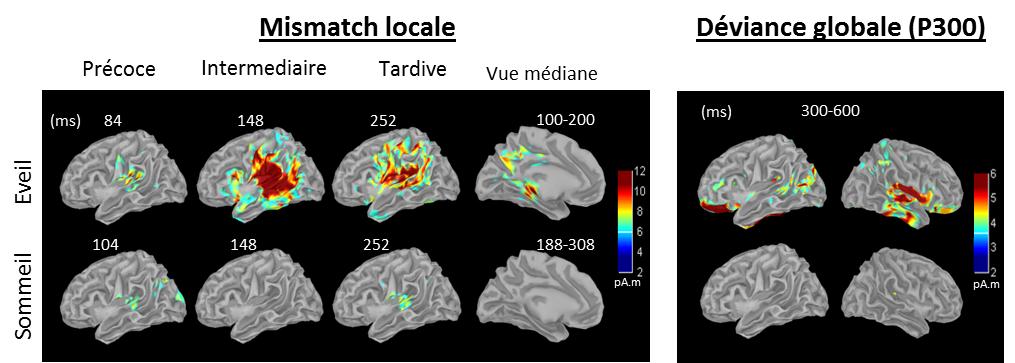When listening to a melody, the brain in its waking state uses the regularities of the sequence of sounds to predict the upcoming sounds. This predictive ability relies on the hierarchical functioning of a set of brain regions. If a sound disrupts the regularity of the sequence, the brain will then generate a series of prediction error signals responsible for surprise reactions (among other things). At least two successive error signals exist: mismatch negativity (MMN) and P300. MMN has already been observed in subjects in a non-conscious state, whereas P300 is specific to conscious processing. So what happens during sleep?
A CEA-I2BM team at the Neurospin – in collaboration with the sleep and alertness center at the Hôtel-Dieu in Paris (AP-HP), the institute of the brain and spinal cord (ICM), the Collège de France, and the Paris-Sud and Paris-Descartes Universities – studied the two prediction error signals in awake and sleeping subjects, using electro and magnetoencephalography (E/MEG).
The researchers asked volunteers to sleep within the MEG machine at the NeuroSpin, in the presence of repetitive sounds. The results confirmed that P300 is a specific marker of the conscious processing of sounds, since it disappeared with sleep onset. In contrast, MMN was observed at all stages of sleep. However, this signal is only partially maintained since certain brain regions, which are normally active in the waking state, no longer respond to the auditory stimulus during sleep. Only passive sensory adaptation phenomena persist, localized to the primary auditory regions.
The researchers thus demonstrated that this default in communication between brain regions prevents the brain from making predictions during sleep. However, it is still capable of representing the sounds within the auditory regions and habituating to them if they are frequent, which explains why an alarm wakes us up, but not the regular sound of a clock.

Reconstruction of the cerebral sources of error signals from the MEG recordings. The signals indicating a prediction error (the intermediate part of the MMN and P300) disappear during sleep. Only the passive sensory adaptation mechanisms (early and late parts of the MMN), which are confined to the auditory regions, persist. The different times, expressed in milliseconds, measure the delay in response to the sound. Credit : CEA